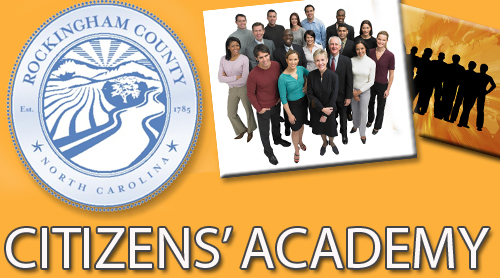
I was pleased to moderate a panel discussion of four citizens academies coordinators a few weeks ago (February 5) at the North Carolina City & County Management Association’s Winter Seminar held in Durham. The panel consisted of: Mable Scott (Rockingham County Citizens’ Academy), Peter Franzese (Concord 101), Lana Hygh (Cary School of Government), and Deborah Craig-Ray (Durham Neighborhood College). This group represented many years of experience running successful citizens academies and the resulting discussion yielding many great insights that should be useful to others that offer (or plan to offer) a citizens academy in their community.
The program in Rockingham County (the youngest of the group, in its third year, whereas the other programs have been around for more than a decade) has been very successful–and popular–in large part due to the way the program truly engages citizens. One of the most interesting innovations in my view is the way in which the program is overseen my a steering committee. In fact, the program advertises itself as a “citizen-led academy.” This helps program coordinator Mable Scott ensure that the content meets participants’ needs and interests and that it is delivered in a way that is accessible and helpful. But involving citizens in planning and overseeing the program also creates a buy-in that is bound to be very helpful in long-run. It also is a source of fresh and fun ideas for how to make learning about county government interesting, such as a video starring a cat that wants to run for “county cat-missioner” that walks viewers through the steps it takes to run for office.
The Town of Cary’s School of Government (which, program coordinator Lana Hygh would add, was named before the UNC Institute of Government changed its name to the School of Government) has been around a long time is is truly a “gold standard” program that many others have learned from. One of the reasons for the program’s success has to do with the way content is presented. Sessions are interactive and hands on and taught by very engaging staff members. A good example of this approach to teaching is how participants learn about the water system–they get on a bus and start out at the water intake facility at Jordan Lake and literally follow that raw water through the system to the residential tap. The program in Cary is also notable in the way it cultivates well qualified applicants for advisory boards and commissions. Graduates are encouraged to apply to open positions and the application and review process occurs right after graduation.
Concord’s program has been around since 2001 making it possibly the first citizens academy in North Carolina. One of its hallmarks is the way in which the program seeks continuous improvement (which is consistent with the city’s “high performance” moto). Participants evaluate the program and help coordinator Peter Franzese identify not only what is working well and what needs improvement, but also what additional topics participants would be interested in. Over the years, several new sessions have been added to the lineup as a result. The program is one of the longer ones that we know about with 15 weekly, 2.5 hour sessions held during the Fall. But attendance is always strong and the feedback is usually that people want more, not less! This speaks to the quality of the program but also to the responsiveness of Franzese and others working with Concord 101. This responsiveness and continuous improvement of the program is certainly a best practice to emulate.
One of the notable aspects of Durham’s Neighborhood College is that it is one of few joint city-county citizens academies that I am aware of. For many years now Durham County and City have collaboratively offered this popular program to residents. The two governments share the cost and the program covers municipal and county services. Offering the program together also reinforces a spirit of partnership that is important to both organizations. One of the other notable practices mentioned by Deborah Craig-Ray (assistant county manager) is the practice of carefully selecting participations to ensure each class is diverse in a number of respects. Seats are held for high school students, for example. Geographic representation is an important factor as well.
As we learn more about citizens academies, looking to some of these successful programs will be key. These four programs have waiting lists. Most don’t need to heavily advertise because word-of-mouth is generating a lot of applicants each session/year. This runs counter to the notion of apathetic citizens and reinforces the importance of local governments reaching out, proactively, to citizens to build capacity for authentic engagement. I would be interested to hear in the comments section below your experiences with citizens academies, both innovations worth sharing and questions or even frustrations that some of the readers of this blog could respond to.